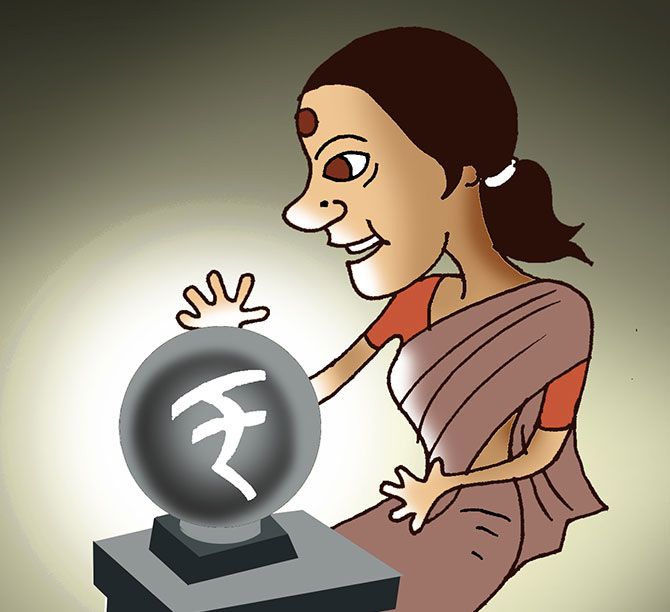Electronic transactions are rising fast, so are cases of payment failure and delayed settlement.
One needs to be proactive, says Tinesh Bhasin.
Illustration: Dominic Xavier/Rediff.com

The government's demonetisation drive has forced people to adopt digital payments. But as the numbers of electronic transactions are rising rapidly, so are issues related to those.
While shopping online, Deepika Kohli used a mobile wallet for payment. The service provider e-mailed that her transaction was successful. But the online retailer claimed it didn't receive the money.
It has been over a week and she has no clue where the money disappeared.
"Depending on the instrument used for a transaction, it can take from a few seconds to seven working days for settlement. If it takes longer, the money usually is in a pool account that wallets or banks maintain with the payments network provider," says Hari Velayudan, head-service delivery at PayU India.
The Reserve Bank of India has timelines for reconciling failed ATM (Automated Teller Machine) transactions. No such guidelines have been issued for newer instruments such as wallets or unified payment interface.
Banks need to reconcile failed ATM transactions within seven working days after a customer has lodged a complaint. Else, there's a penalty of Rs 100 each day of delay.
Claiming your funds
If you or the vendor has not received money within two to seven days, depending on the transaction, you should approach the wallet service provider.
"After demonetisation, the volume of transactions has increased 10 times but the headcount has only gone up by 1.5 to 2 times. Some players might therefore take longer to resolve transaction failure queries," says Akash Gupta, vice-president (marketing), MobiKwik.
But wallet players are increasing headcount rapidly.
Before November, the MobiKwik team had 160 employees and by March-end, the count could touch 1,000.
If you don't receive a satisfactory response at first level, escalate the issue.
"Every wallet player has grievance redressal guidelines on its Web site that provides contact details of different authorities," says Vinay Kalantri, managing director, The Mobile Wallet.
The final authority for resolving problems with most is the Grievance Officer.
"If customers are not happy after escalation, they can approach the grievance cell of the RBI," says the Freecharge spokesperson.
Sony Joy, co-founder and chief executive of Chillr, says posting on the company or bank's social media pages can help in quick resolution.
"Brands are very cautious about their social image. A user should reach out to the brand through their social media handles if it is has taken more than seven days."
While seven days is the maximum it should take for you to get your money back in most cases, you should start following up with the wallet provider after 48 hours.
Transfers via net banking
When an individual transfers money from a bank account to a wallet via net banking, it happens in a two-step process.
There's a payment gateway between the two, which fetches money from the bank and forwards it to the wallet.
A transaction failure can happen after money leaves the bank account but doesn't reach the payment gateway due to bad connectivity, server problems, etc.
Payment gateway companies settle payments with banks every day. A user should get his money back in the bank account within two business days.
If not, he should start following up proactively.
If the failure happens after the payment gateway receives the money, the funds should reach the wallet within two business days.
"The individual needs to contact the wallet company to help resolve the issue," says Velayudan.
Deepak Abbot, senior vice-president at Paytm, says delays are only experienced when a customer transfers money to a bank from the wallet.
"Delays are often due to queues at the bank level to process the refund. We immediately issue a reference number to the customer, which can be quoted to the bank for faster redressal," says Abbot.
"Paytm has no control over a bank's processes. We can only guide the customers who reaout to us," adds Abbot.
Transfers via cards
The process is similar to transfers done using net banking.
But it can take as many as seven business days for the money to reach back to the user's bank account or card.
It depends on the process an individual's bank follows.
Some banks have a central pool, from which the money is transferred to the customer's account.
Some also have individual pool accounts for each branch.
In such cases, it can take longer for a person to get his money back if transactions fail.
Failure at merchant
If you pay a merchant using a wallet and the transaction is not completed, as with Kohli, the funds should be back in your wallet immediately.
A merchant only accepts payment from a wallet if it is on the same platform.
As there are no other parties involved, it should take a few seconds for the transaction to reverse.
An individual should seek the help of her/his wallet the next day in such transaction failures.
This is also applicable when you have done a booking for a bus, train or flight using a wallet, but later cancel the tickets.
Once the merchant issues a refund, it should not take more than a few minutes to reflect in the individual's wallet.
"In the digital space," says Gupta of MobiKwik, "a person needs to be cognisant and watchful, as it is a relatively new way of payments. The systems and processes of digital payments players are evolving."










